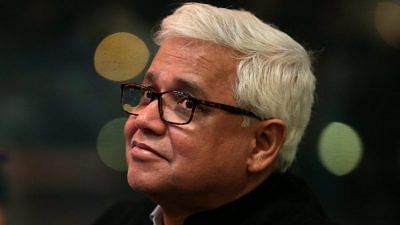New Delhi: The western world has built itself on an extractivist economy that has fuelled today’s climate crisis, and these countries come to climate negotiations more to serve their own interests than anything else, author Amitav Ghosh has said.
“In the West, climate change is seen as a technocratic problem that can be fixed with clean technologies. But anywhere else in the world, it’s seen as a geopolitical problem, and one of inequality,” he said in conversation with Editor-in-Chief Shekhar Gupta at ThePrint’s Off the Cuff Sunday.
“The geopolitics of climate change is never discussed at meetings like the COP, which are oriented towards these technocratic and technological solutions. That is really the speaking point,” he added.
The COP, or Conference of Parties, is the world’s biggest climate conference where countries come together to discuss ways to slow climate change. The 26th COP started Sunday and will go on till 12 November.
Ghosh also said all the world’s governments are adept at “greenwashing” — pretending their actions are environmentally sound — in the pursuit of unsustainable growth. India, he said, is “especially bad” when it comes to this.
“Take for example the coastal road project in Mumbai. Rising sea levels are going to completely threaten this highway, and it makes absolutely no sense to go through with it,” he said.
Also Read: Amitav Ghosh is the Jnanpith Award winner and climate crusader India doesn’t know it needs
Nutmeg and climate change
Ghosh’s latest book, The Nutmeg’s Curse: Parables for a Planet in Crisis, traces the origins of climate change to settler colonial countries. More specifically, Ghosh uses the 17th-century massacre of the Bandanese in Indonesia by the Dutch to illustrate the violence and plunder that propelled climate change.
The Banda islands were the only place on Earth where nutmeg was grown before the 16th century, according to Ghosh. The Dutch subsequently occupied the island to secure its production, and killed thousands in the process, he said.
“The plan was to have a monopoly over these spices, and the Dutch took it to another extreme,” he said. “Abuse of the Earth’s resources was completely led by European colonisers in the 16th, 17th, and 18th centuries. Countries are being destroyed by these resource curses.”
Ghosh also dealt with the subject of climate change in his 2016 book The Great Derangement.
Urban, middle-class Indians most ‘at risk’
Even though the popular notion is that the most vulnerable groups of society will be adversely affected by climate change, Ghosh said this wasn’t the “most accurate portrayal”.
“I think the people who are going to be worst impacted by climate change will be middle-class people. For example, if a cyclone were to hit Mumbai, the working-class people would leave, because they have deep connections around the countryside,” he said.
“But it will be the middle-class people who will be stuck in their houses and will not want to leave, simply because all their wealth is accumulated in real estate, cars, and so on. They will be genuinely devastated.”
(Edited by Sunanda Ranjan)
Also Read: Congress, Left, BJP – India striving to remake itself as settler colonialist: Amitav Ghosh
